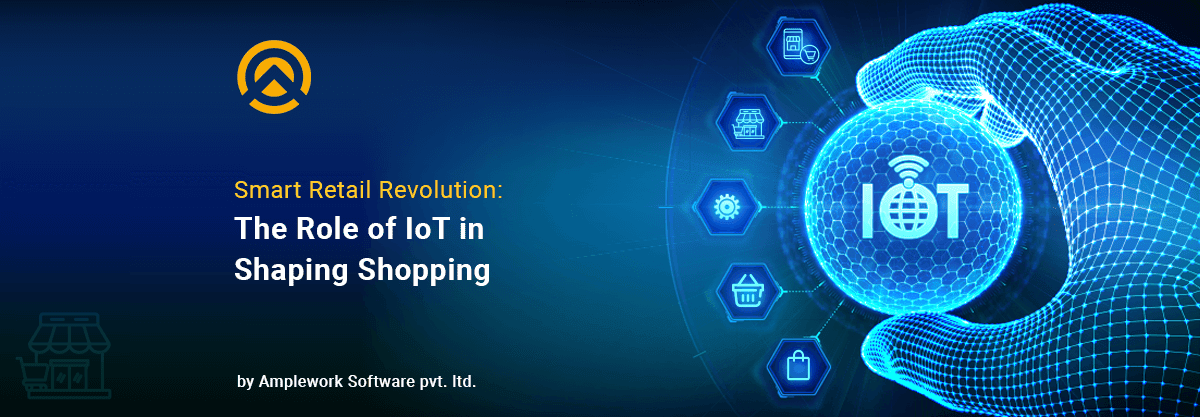Digitalization is the kind of asset that can deal with sudden hurdles of market conditions. The era of the COVID-19 pandemic made consumers opt for digitalized or online shopping options. The process of making the retail sector completely automated and smart retail started its journey after this pandemic. In the current situation, the development of e-commerce app development is getting way too easy which takes a few hours for the whole completion. This only becomes possible with the integration of technology like the Internet of Things (IoT). Which has the quality of reforming the traditional features.
These features result in a complete reformation of traditional retail operations with ample positive possibilities. The major advantages provided by IoT integration are higher customer satisfaction, an increment in overall productivity, proper streaming of operations, and innovative management of retail operations. The retail market is reforming with the emergence of various technologies. As the static data by EY Reimagining Industry Futures Study 2022, presents the analysis of top emerging technologies in the retail sector.
 Source: EY Reimagining Industry Futures Study
Source: EY Reimagining Industry Futures Study
All these technologies are presented with the help of three criteria for accurate analysis and study. Which are currently investing, plan to invest in one year, plan to invest in two to three years, monitoring technology, no plans to invest, and technology is not related to my organization. As per the above figure, the respective percentage criteria for IoT emergence are 42%, 16%, 13%, 21% and 8%. Along with IoT, the other technologies are Analytics and AI, robotics and automation, edge computing, Augmented and virtual reality, The Fifth Generation (5G), Blockchain, and Quantum Computing.
Blog Highlights
In This blog, we are looking forward to presenting a knowledgeable aspect of integrating IoT within the retail sector of the economy. The major highlights of this remarkable IoT and retail journey are its major benefits, implementing practices, and challenges faced. A quick read of this blog can ensure proper guidance for implementing IoT-based automation.
IoT’s Retail Revolution: Unlocking the Advantages
The development of the retail industry with IoT-aided solutions can bring a major change to this sector. With the practice of connecting different devices and creating data networks, one can effectively work on IoT mobile app development. The reformation of shopping practices with these smart devices can result in different benefits. These are as mentioned further.
1. Increased Productivity
The development of smart solutions directly works on reducing the shopping time of consumers. As the manual process consumes plenty of time. The reduction of time factor outcomes in enhancing the productivity of the retail sector. In other words, the integration of smart and fully digitalized shops or markets can work to enhance the productivity of the business. Devices based on this technology can be implemented to monitor real-time innovations, as this practice can work on allowing these technologies to respond to changes quickly the demand criteria and avoid stockouts.
2. Streamlined Operations
In the current era, the concept of ease revolves around the concept of automation. With the integration of IoT devices, the retail sector can completely reform its working practices with automation. In this, the integration of IoT devices like sensors can assure you of proper handling of retail operations. This aspect can result in benefits like effective maintenance of assets, optimized supply chain practices, effective maintenance of labor efficiency, initiation to the loss preventing practices, data-driven decision making, and involvement of waste reduction practices.
3. Enhanced Inventory Management
It is considered a critical aspect of retail businesses that impact different factors of retail operations. The IoT devices or techniques can help track their inventory with real-time records and their levels. In this, the concept of the automated triggering of orders takes place during the situations of reduction of available product stock below the predetermined threshold level. This complete process helps in dealing with the conditions of stockouts and overstock. Along with this, the retailers are capable of tracking the movement of products in the stores, helping the employees to quickly locate the items according to the needs of consumers.
4. Enhanced Customer Engagement
The involvement of these IoT solutions is making many changes in industrial retail practices. The integration of devices based on this technology provides different variety of data sets and these analyzed data sets are used in predicting the major preferences of the consumers. With the analysis of this data, the retailer is able to analyze the behaviors, shopping habits, and brand loyalty of the consumers. Along with this, the smart app with sensor solutions provided by the IoT app development companies can result in tracking the movement of the customers. This tracking of the data on consumers’ favorite products can be gathered with respect to the location.
Empowering Retail Through IoT-Enabled Smart Solutions
When we compare the levels of market investments, the retail sector is getting the most while comparing it to the overall market of information technology (IT). The current market demands are highly focused on data analytics solutions, AI-aided solutions, and automation and robotic solutions. The below figure represents an analysis of the smart retail ecosystem by Capgemini. This ecosystem represents a variety of technologies, hardware platforms, and protocols.
 Source: Smart Retail Ecosystem by Capgemini
Source: Smart Retail Ecosystem by Capgemini
In these shown ecosystems the major applications of all these solutions are as mentioned further. These are crowd monitors, virtual fitting rooms, self-service checkout and automated payments, smart shelf, thermal monitoring & protection, price check codes, supply chain monitoring, smart light and temperature sensing for energy-saving control, asset tracking, smart shopping cart, in-store guide robot, in-door navigation ads push, facial recognition preference push, digital signage, in-store navigation, sensing techs for product lifecycle in the shelf, product life checkers while performing packaging, real-time batch price change and availability of product status on intelligent device. With these emerging practices, the most trendy implementations are presented further.
1. Integrating IoT with 5G
Having a presence in frequently changing concepts of retailing operations, the newly emerging technologies need to take into consideration the isolation factor. In other words, the emergence of new technology needs to be adapted in a way that it can appropriately collaborate with other newly innovated technologies and their infrastructure. In this context collaborative implementation of IoT and 5G techniques can result in different benefits for the retail industry. The selection of the right infrastructure and integration results in smooth and consistent results. The innovation of 5G has the features of low latency, high bandwidth, and high speed. The availability of such features makes this technology work as a glue for bringing different technologies into the retail sector. The coming future is about 5G and IoT.
2. Open to Technical Collaboration
The major requirement of the retailing sector is to speed up its digitalization program and develop strategies for newly emerging technologies. The effective collaboration of technicality providers and retailers can result in many beneficiary aspects for the retailing sector. In this, the retailer can approach technical solution providers and work in a collaborative manner.
3. Following The Three I’s Approach
The Three I’s approach is considered an effective solution for figuring out the effectiveness of the technical solutions. In this, the three I’s are invisibility, intimacy, and indispensability. Respectively defined as wanting to make life easier, proper satisfaction from the selected service, and level of improvements gained from these solutions. Retailers can work on analyzing their customers according to this approach. And opt for mobile app development services according to the desired criteria of digital services.
4. The Concept of Consumer IoT (CIoT)
This is considered the most beneficial approach for bringing IoT innovation within the retail sector. With this approach, the retail organization can work with an IoT app development company to revolutionize the standard retail stores into smart ones. In this, the mobile app developers can focus on a customer-centric approach, while taking care of customers’ tastes, needs, and habits. Along with this, retailers can involve the integration of other techniques like AI, machine learning, and data analytics for more beneficial aspects.
Read more: Impact of IoT in Mobile Application Development
Challenges of IoT Development in the Retail Sector
No doubt, the integration of newly invented technologies provides different benefits but it also comes up with different challenges. The IoT applications are effectively capable of transforming the traditional retail markets but also have some consequences that are equally required to be addressed.
Diverse Nature of IoT Devices
The retail industry relies on a wide array of IoT devices, ranging from RFID tags and sensors to smart shelves and beacons. Managing this diversity poses a notable challenge as retailers must ensure that these disparate devices can seamlessly work together. Compatibility issues can arise when different devices use varied communication protocols or technologies. This necessitates careful planning and integration to avoid operational inefficiencies and data silos. Achieving true interoperability between these devices is essential for reaping the full benefits of IoT technology in retail.
Security as a Major Concern
Security stands as a paramount concern in IoT adoption within the retail sector. IoT devices collect and transmit sensitive data, encompassing customer information, inventory details, and more. Protecting this data from cyberattacks and breaches is a top priority for retailers. Vulnerabilities in IoT device security can be exploited to gain unauthorized access to a retailer’s network, potentially compromising customer privacy and business integrity. Robust security measures, including encryption, access controls, and regular security audits, are imperative to safeguard both devices and the valuable data they generate.
Affordability and Operational Cost Issues
While IoT promises substantial benefits, it often demands a considerable initial investment. Acquiring and deploying IoT devices and the necessary infrastructure can be financially daunting for retailers, particularly smaller businesses. Beyond the initial expense, ongoing operational costs, such as device maintenance, data management, and system upgrades, can accumulate over time. Retailers must carefully budget for these expenses to ensure the long-term sustainability of their IoT implementations. Striking the right balance between investment and operational costs is a key challenge in maximizing ROI from IoT technology.
Lacking Expertise
The relatively nascent nature of IoT technology poses a significant challenge for retailers in terms of expertise. Finding personnel with the necessary skills to design, implement, and manage IoT systems can be an arduous task. The skill gap in this emerging field can hinder the successful deployment and maintenance of IoT solutions. Furthermore, IoT generates vast amounts of data that require sophisticated analysis to extract meaningful insights. Retailers often lack the in-house data analytics expertise needed to derive actionable information from this data. Bridging these skill gaps is crucial for harnessing the full potential of IoT technology in retail and staying competitive in the evolving landscape.
Wrapping Up
In the realm of modern retail, the landscape is undergoing a profound transformation thanks to the integration of Internet of Things (IoT) technology. This revolutionary shift goes beyond conventional shopping experiences, ushering in a new era of intelligent retail. In this blog, we worked on highlighting the IoT-driven revolution in retail, exploring how it’s crafting smart retail experiences that transcend the boundaries of traditional shopping. In this journey, we uncovered the transformative power of IoT in retail and its impact on the future of shopping.
Amplework is a prominent player in the market, boasting more than 5 years of extensive industry experience. Our firm’s foundation is built on trust and reliability, and our dedicated team has consistently met clients’ project requirements across numerous endeavors. This dedication has led us to achieve a remarkable milestone, surpassing 200 million in revenue. Explore our website to discover the wide range of services we offer.










